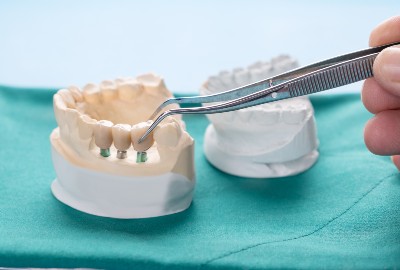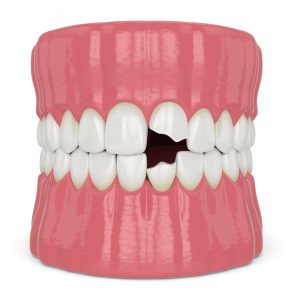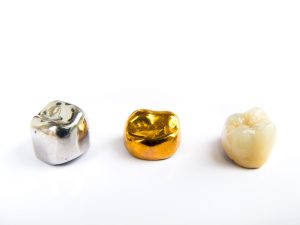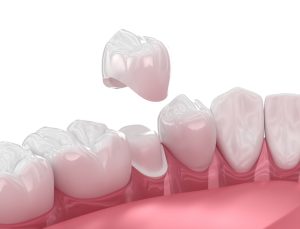Dental Crowns in Rosenberg, TX
Dental Crowns: Restoring and Repairing Your Smile
Tooth decay is among the most common causes that guarantee a trip to the dentist. It may cause severe discomfort, inhibit your normal oral functions, and taint the appearance of your smile. Minor cases of tooth decay can benefit from dental restorations, but if your teeth have extensive damage, the better option is to get crowns.
At Rosenberg Dental and Implant Center, led by Dr. Samuel Collins, we offer customized crowns that provide full coverage and protection for weakened teeth. Dental crowns have an uncanny resemblance to natural teeth, so they’re a perfect option to restore your attractive smile! If you’re concerned about tooth decay, call us today at (281) 369-9242 to learn more about dental crowns in Rosenberg, TX.
Request An Appointment

What Are Dental Crowns?
Dental crowns, sometimes referred to as dental caps, are fixed prosthetic devices used by dentists to cover or “cap” a damaged or weakened tooth. They serve a dual purpose in dental practice — providing structural support and enhancing the appearance of the tooth.
Benefits of Dental Crowns
Protection
Dental crowns are commonly used to protect and strengthen teeth that are significantly decayed, fractured, or weakened due to large dental fillings, root canals, or other dental treatments. They encase the entire visible portion of the tooth, preserving its structure and preventing further damage.
Restoration
Crowns can restore function and appearance to a tooth. They’re custom-made to match the shape, size, and color of the natural teeth, ensuring a seamless blend with the rest of your smile. They can also fix problems that fillings can’t.
Materials
Crowns can be made from various materials, including porcelain, ceramic, metal (such as gold or alloy), and a combination of materials. The choice of material depends on factors like the location of the tooth, your cosmetic preferences, and Dr. Collins’ recommendation.
Uses
Crowns are versatile and can be used for various purposes, such as covering discolored or misshapen teeth, protecting teeth with large fillings, supporting dental bridges, and capping dental implants.
Longevity
With proper care and maintenance, dental crowns can last for many years. Regular oral hygiene practices, like brushing and flossing, along with routine dental check-ups, are essential for ensuring the longevity of your dental crown procedure.
Schedule your service appointment!
Types of Dental Crowns
During your initial visit, we’ll perform a clinical examination and record digital X-rays to visualize the depth of tooth damage. It helps us to decide which type of dental crown will best meet your needs. Generally, we offer three types of crowns in Rosenberg:
- Metal Crowns: All-metal crowns are made of alloys that contain gold, silver, or other metals. These dental crowns have exceptional strength and durability but don’t look visually appealing. Additionally, those with metal allergies may react badly to this type of crown. Due to these reasons, we only recommend metal crowns in specific cases of posterior teeth and for those who don’t possess metal allergies.
- Porcelain Crowns: These crowns consist entirely of porcelain and have a perfect resemblance to your teeth. All-porcelain crowns are ideal for the restoration of anterior teeth, which are visible when smiling.
- Porcelain-Fused-to-Metal Crowns: Commonly called PFMs, these crowns combine the strength of metals and the aesthetics of porcelain. Porcelain-fused-to-metal crowns have a thin layer of metal underneath porcelain that forms the outer anatomy.
 When Is It Necessary To Get Dental Crowns?
When Is It Necessary To Get Dental Crowns?
Our dentist recommends crowns if you have:
- Extensive tooth decay
- Damage due to trauma/injury
- Broken, chipped, or fractured teeth
- Tooth discoloration
- Root canal-treated teeth
- Severely worn-out teeth due to excessive grinding
- Teeth with irregular shapes or sizes
- Single dental implants
The Dental Crowns Process
Consultation
The dental crown process begins with an initial consultation with Dr. Collins at Rosenberg Dental & Implant Center. During your consultation, Dr. Collins discusses your dental needs and preferences for the crown’s appearance. Your consultation is a great time to ask any questions or voice any concerns you may have.
Examination and Diagnosis
Following the consultation, Dr. Collins conducts a thorough examination of the tooth that requires the crown. This exam involves assessing the extent of damage, checking for decay, and evaluating the overall health of the tooth, often aided by X-rays.
Treatment Plan
Based on the examination results, Dr. Collins drafts a treatment plan outlining the specific steps for preparing, designing, and installing the dental crown.
Design and Fabrication
This phase involves the design and fabrication of the dental crown, including taking impressions of the tooth and its surroundings for a perfect fit. For porcelain or ceramic crowns, color matching is essential to achieve a natural appearance. If necessary, a temporary crown is placed while the permanent one is being crafted.
Tooth Preparation
To accommodate the crowns, the tooth in question is prepared. Local anesthetics will numb the tooth and surrounding area, after which we remove decay, and the tooth is skillfully shaped for an accurate fit. Our team will take impressions if a temporary crown is needed.
Temporary Crown Placement
In cases requiring a temporary crown, it’s gently placed over the prepared tooth, providing protection and maintaining function and appearance until the permanent crown is ready.
Crown Installation
Once the permanent crown is prepared, you’ll return for the final installation. This placement involves removing any temporary crown, precisely fitting the permanent crown, and securely cementing it to the prepared tooth.
Final Adjustments and Polishing
Dr. Collins will make any necessary adjustments to ensure comfort and proper function, followed by polishing to achieve a more natural tooth structure and appearance.
Dental Crown Aftercare 
- Maintain Excellent Oral Hygiene: Continue to brush your teeth at least twice a day and floss regularly. Pay particular attention to the area around the crown to prevent plaque buildup and maintain gum health.
- Use a Soft-Bristled Toothbrush: Opt for a soft-bristled toothbrush to avoid excessive pressure on the crown and reduce the risk of damaging it or the surrounding teeth.
- Avoid Sticky or Hard Foods: Steer clear of foods that are excessively sticky, hard, or crunchy, as they can potentially damage the crown. Chewing on ice or biting into very hard substances should be avoided.
- Be Cautious with Your Bite: Be mindful of how you bite and chew, especially during the initial days following crown placement. If you notice any discomfort or feel that the crown isn’t fitting properly, contact our dentist for an adjustment.
- Regular Dental Check-ups: Maintain your routine dental check-ups and cleanings. These appointments allow our dentist to monitor the condition of the crown, check for any signs of wear, and address any issues early.
- Treat Teeth Grinding (Bruxism): If you grind or clench your teeth, discuss this with Dr. Collins. He may recommend a nightguard to protect your crown and natural teeth from the effects of bruxism.
- Watch for Signs of Concern: Keep an eye out for any signs of concern, such as sensitivity, pain, or a change in the fit of the crown. If you notice anything unusual, contact us promptly for evaluation.
- Proper Nutrition: Maintain a balanced diet and limit sugary foods and acidic beverages, which can contribute to decay and damage to the crown.
- Avoid Smoking and Tobacco Products: Smoking and tobacco use can stain and weaken the crown over time. Quitting or reducing tobacco use can benefit both your crown and oral health.
- Maintain Good General Health: Good health is essential for the health of your mouth. Certain systemic conditions can affect dental health, so managing them can contribute to the longevity of your crown.
Frequently Asked Questions
Can a crowned tooth get cavities?
While the crown itself cannot develop cavities, the natural tooth structure just underneath it can still be susceptible to decay. It’s essential to maintain good oral hygiene to prevent any decay in the area where the crown meets the natural tooth.
Do dental crowns feel different from natural teeth?
Well-designed crowns closely match the color, shape, and texture of natural teeth. In most cases, they should feel and function just like your natural teeth, making them difficult to distinguish.
Can a dental crown come loose or fall off?
While it’s rare, crowns can sometimes become loose or dislodged. This movement can occur due to factors like decay, trauma, or improper fitting. If you notice a loose or missing crown, contact your dentist promptly for evaluation and potential re-cementation.
Can a dental crown be whitened if it becomes discolored?
Dental crowns made of porcelain or ceramic don’t respond to teeth whitening treatments. If a crown becomes discolored, it may need to be replaced to restore its natural appearance. Regular dental cleanings can help prevent staining and discoloration.
People Love Us on Google
Google Reviews
Renae Williams
Veda Handy
Kimberly Washington
Reclaim Your Smile with Dental Crowns
Is tooth decay or damage affecting your smile? Discover how crowns from Dr. Collins at Rosenberg Dental and Implant Center can repair and protect your teeth. Contact Rosenberg Dental & Implant Center today at (281) 369-9242 to learn more about restoring your confident, healthy smile with custom crowns in Rosenberg, TX.
Serving Rosenberg and surrounding areas such as Beasley, Sugar Land, and Simonton. Your journey to a revitalized smile begins here!


